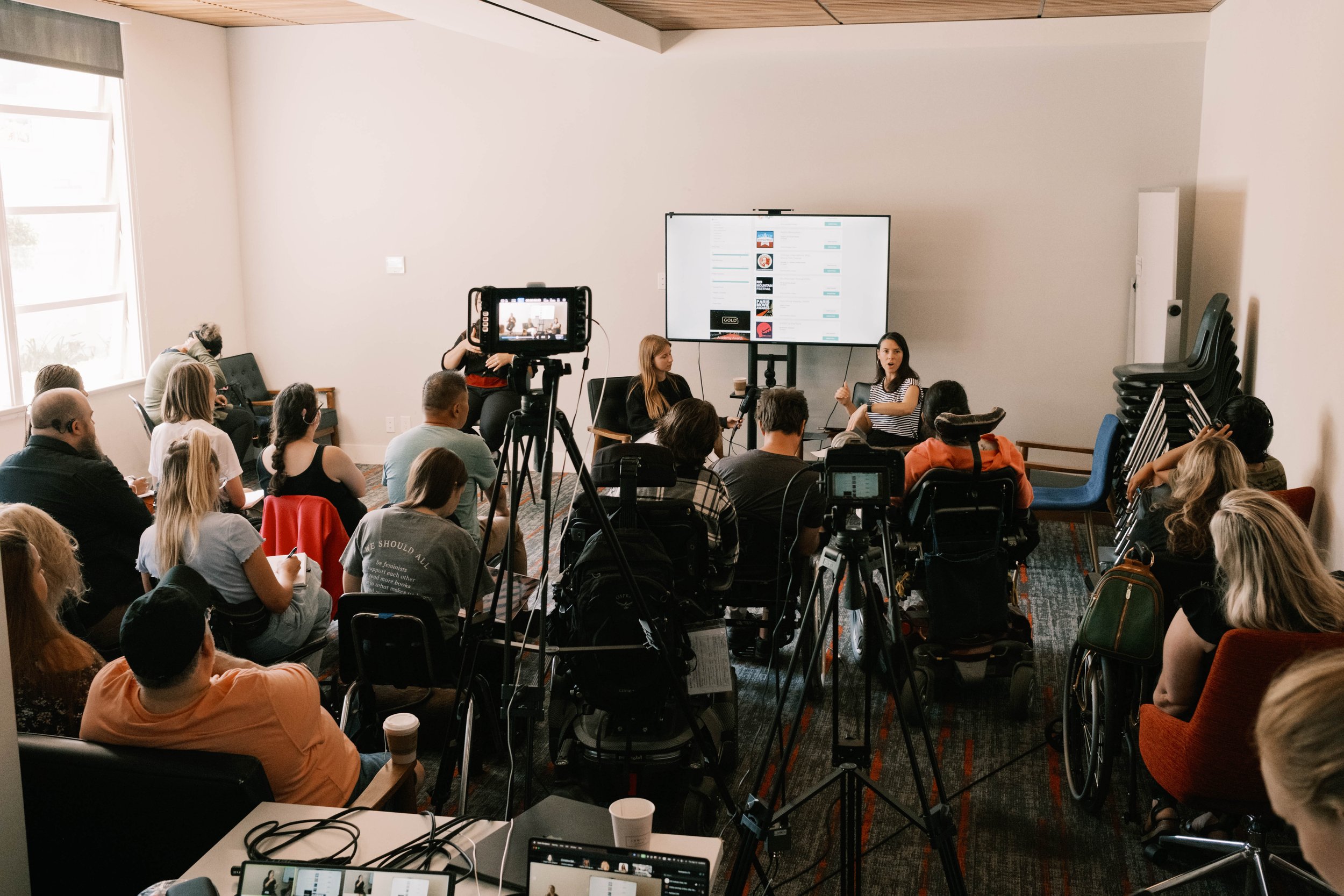
Navigating Film Festivals with Floriane Andersen’s Insights: A Guide to Festival Strategy via FilmFreeway
Recently, Cinematography for Actors collaborated with the Easterseals Disability Film Challenge to produce festival strategy workshops held at AFI. This initiative provided insights into the festival circuit and submission strategies, enriching CFA's offerings to filmmakers.
Floriane Andersen, a CFA board member and experienced filmmaker, has shared a remarkable wealth of knowledge in this talk. A bilingual French actress, she trained at the National Conservatory of Dramatic Art in Annecy and graduated from Cours Florent in Paris and EMCAM in Marseille. Her notable acting credits include roles in Shiddat, TF1’s series Elite Squad, and the acclaimed Henry V production by Antic Disposition, which toured England and France. Additionally, she founded Artak Pictures, an all-female production company, and won Best Directing at the Burbank International Film Festival for her film Unforgotten.
Having originated from France, Floriane discovered that the approach to short film festivals is vastly different in the U.S. This discovery led her to redefine her strategy for festival success through the FilmFreeway platform.
Through two significant projects—Unforgotten, which has completed its festival circuit, and Rattled, currently in post-production—Floriane shared her experience and strategies for maximizing exposure and connecting with audiences, other filmmakers, and industry professionals.
Step 1: Clarify Your Festival Goals
Before submitting your film, you may want to consider your primary objective. Floriane shared the types of festivals you should target based on your goal:
If you are aiming for awards, target smaller, established festivals. High-profile festivals like Sundance, SXSW or TIFF are challenging to win at without significant reputation or resources and often come with high entry fees.If you want to network, aim for festivals that have education and networking opportunities in addition to screenings. Include BAFTA and Academy Awards qualifiers, which are excellent for expanding your network.
Don’t forget local festivals to meet with local filmmakers that you can potentially collaborate with.
If you truly want to connect with your audience, select festivals with specific themes that align with your film’s content.
Ask your network for referrals to festivals that they had a successful run at. Did they enjoy the programming? What types of people did they meet? Was it “filmmaker-friendly”?
Step 2: Build Your FilmFreeway Account
1. Create an Account and Submit a Film
Start by building a FilmFreeway account. You can then select the "Submit Film" button to upload your project and begin exploring what the platform offers.
2. Fill Out Your Profile
Floriane emphasizes the importance of completing every section in your FilmFreeway profile. When completing your bio and director or producer statement, the key is to keep it short, sweet, and tailored to the project. You can also provide a brief but compelling description of your journey as a filmmaker.
It’s also good to include any articles or media coverage which can enhance your project's appeal.
3. Leverage the “My Lists” Feature
The "My Lists" feature allows you to bookmark favorite festivals. You can tailor your list according to your project goals, whether that’s to win awards, network, or reach a broader audience.
Step 3: Budget Wisely for Festivals
Budgeting is a top-notch skill for any filmmaker for film festival success. Floriane shared some financial tips when planning your festival submissions:
Plan for festival entry fees: Festivals are not cheap, so try to allocate an amount in your post-budget,specifically for entry fees.
Submit early: Alternatively, you can enter early to save money on entry fees, as prices often rise closer to the deadline. It’s always better to be early. Schedule on your calendar.
FilmFreeway Gold: This paid option offers discounts on festival submissions, and the festivals listed tend to be more reputable.
Step 4: Crafting Your Project Submission
When creating a project on FilmFreeway, here’s what Floriane advised to do:
Add your Project Type, Title, and Website.
Fill in all technical details and list your full team in the credits section. This way, if your film wins an award, it will be acknowledged across all contributors’ profiles.
Avoid listing the IMDb release date until you complete your festival circuit.
Add a cover letter to your submission, especially if you have received grant funding. Also, follow platforms like Film Fatale on social media for festival deadlines and updates.
Common Questions and Answers
-
Absolutely! It’s generally a producer’s role to submit to festivals. If you’re also an actor, you can include that in your bio, but emphasize the producer aspect for this context.
-
Yes, a producer’s statement adds depth to your submission.
-
Only list the lead producer. You can add other producers in the “Credits” section.
-
It can take months, as some festivals have a 6-month open window. Be aware that festivals may request a premiere status, so plan submissions strategically to avoid clashes.
-
Yes. Tailor your bio to each specific project to align with the festival’s audience and tone.
-
Earlier is better. Festivals may offer discounts or waiver codes, but be cautious with unsolicited offers. Always confirm waiver codes by emailing the festival directly.
-
Use the “Festival Focus” section and keywords relevant to your genre. Start locally to establish a reputation before expanding to larger or international festivals.
-
Aim to submit to about 10 festivals for every one you hope to be accepted by. Floriane advises that winning awards at smaller festivals is often more beneficial than merely being selected at larger ones.
-
Apply as a series and include all episodes, if applicable.
Here’s a collection of questions Floriane addressed, which are helpful for anyone navigating the festival circuit:
From Floriane’s experience, film festivals have become much more than just a platform to showcase one’s work. They’re a space for connection—bringing together audiences, fellow filmmakers, and communities.
The relationships she has built through these experiences are invaluable, reminding her that festivals aren’t just about winning awards but about sharing film, experiencing it with an audience, and engaging deeply with the people who shape the art of storytelling.





